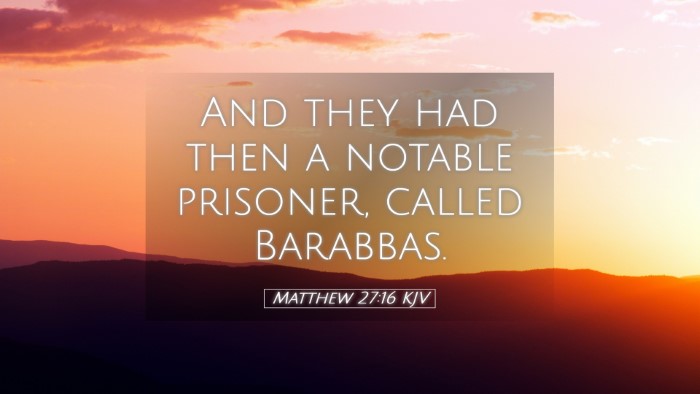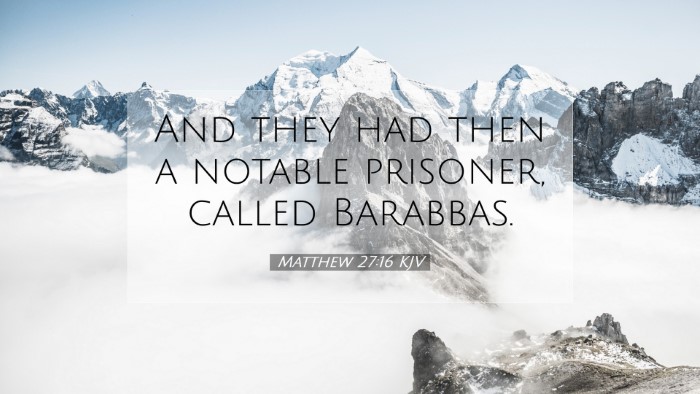Commentary on Matthew 27:16
Matthew 27:16 reads: "And they had then a notable prisoner, called Barabbas." This verse introduces a critical moment in the Passion narrative, as it sets the stage for the choice between Jesus and Barabbas, which reflects the broader themes of justice, innocence, and societal choice.
Contextual Background
This verse occurs within the Passion Week, during which Jesus is arrested, tried, and ultimately crucified. Barabbas was a notorious prisoner, and the mention of him emphasizes the stark contrast between him and Jesus, who was innocent and righteous. This choice made by the people reveals their priorities and moral compass in a time of significant upheaval.
Insights from Matthew Henry
Matthew Henry highlights that the selection of Barabbas over Jesus serves as a poignant illustration of human folly. His commentary emphasizes:
- The Nature of Sin: Henry notes that in their choice, the people typify the sinful nature of humanity. The decision to free a known criminal instead of the innocent Savior encapsulates the rejection of righteousness.
- The Sovereignty of God: Despite the apparent injustice, Henry asserts that this was part of God's sovereign plan, foreshadowing the sacrificial nature of Jesus' death.
Insights from Albert Barnes
Albert Barnes provides a thorough analysis of the cultural and historical meanings behind this passage:
- The Role of the Governor: Barnes explains that the Roman governor, Pontius Pilate, offered to release a prisoner as was customary during Passover. This act illustrates the Roman legal system's complexities and the influence of public opinion.
- Barabbas as a Symbol: He notes that Barabbas represents rebellion, being involved in insurrection, a stark comparison to Jesus, who came as a peacemaker. This juxtaposition serves to amplify the choice the people must make and its implications.
Insights from Adam Clarke
Adam Clarke’s commentary adds depth to the understanding of Barabbas’ character and the implications of the crowd's choice:
- Barabbas' Identity: Clarke points out that Barabbas’ name means "son of the father," which inadvertently enhances the symbolism; in choosing Barabbas, the people are choosing a false son over the true Son of God.
- The Collective Responsibility: Clarke emphasizes the communal aspect of sin; the choice made by the crowd signifies collective responsibility for rejecting Jesus, an echo of the ongoing human propensity to resist divine truth in favor of worldly desires.
Theological Implications
The choice between Barabbas and Jesus raises profound theological questions:
- Innocence vs. Guilt: The narrative exemplifies the exchange of the innocent for the guilty, a foreshadowing of Christ’s atonement, where the sinless One pays the penalty for sinners.
- Human Choice and Sovereignty: The dynamics here also invite reflection on the relationship between divine sovereignty and human agency; while the crowd makes a choice, God’s purpose prevails in redemptive history.
Practical Applications
The implications of Matthew 27:16 extend into the lives of believers and the church today:
- Moral Clarity: Pastors and theologians may draw lessons from this text regarding the need for moral clarity in decisions, reminding congregations of the importance of choosing righteousness over societal pressures.
- Reflection on Choices: This passage invites believers to reflect on the choices they make; just as the crowd faced a choice between Barabbas and Jesus, individuals today continuously face choices that reflect their allegiance to Christ.
- Understanding Redemption: The crucifixion of Jesus, orchestrated through the demands of the crowd, becomes a powerful reminder of God’s love and plan for redemption, urging believers to embrace the grace offered through His sacrifice.
Conclusion
Matthew 27:16 serves as a crucial moment in the narrative of the Passion, where the choice of Barabbas over Jesus encapsulates the struggles with sin, societal influence, and divine sovereignty. The insights from Matthew Henry, Albert Barnes, and Adam Clarke provide a rich tapestry of understanding that can guide pastors, students, and scholars in their theological and practical applications of this significant event.


